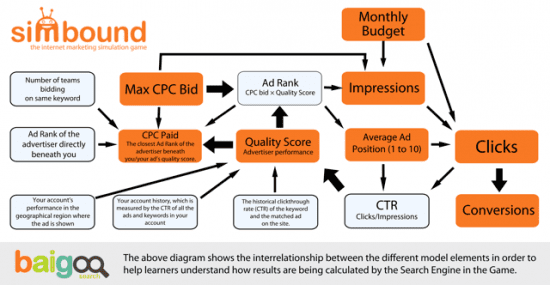How e-marketing talent can be improved with digital marketing training simulations
Business owners and agency executives are looking to provide marketing and sales staff with access to the latest technologies for reaching out to potential customers while creative leaders are looking to enable lean teams which use online tools to plan and execute complex action items with predictable results. The cloud is now enabling a new range of simulation services which can help improve the operational skills and decision-making abilities of marketers through training.
For businesses reliant on digital marketing which experience turnover of personnel that holds different levels of expertise we see two areas that will be transformed by simulation: first, on-the-job training and sourcing candidates for project assignments.
Since the advent of readily available computing resources, simulation has been used in training military staff, in medical schools and in the nuclear energy sector. Simulations provide considerable learning value where there is high-risk aversion.
Today, cloud-based SaaS enables complex simulation technologies to be rendered as user-friendly online applications out of which some include game elements. By providing a fast way to iterate development and add new features, the cloud reduces the historically high fail-rate of new simulation products.
Simulation is ideal for acquiring complex information
E-marketing is a complex, fast-developing industry. The constant stream of tools and techniques evolves as there are increasingly more sophisticated ways of reaching the ‘always-connected’ audience.
Just last week Google announced a series of new additions to its Adwords platform, most being new data visualization options.
By using simulations, marketers can keep up with a constant stream of product innovation and are able to evaluate how new technologies and features impact their particular communications.
Learning with simulations is carried out in rich event scenarios in which the learner faces challenges of the kind that could be encountered while working on a real client project.
Some example decisions in an e-marketing simulation are shown below, here they are adjusting bids for a PPC campaign that is underperforming or testing multiple versions of a landing page in search for a better engagement rate.

The true value in simulation-based learning is that it demonstrates causation between many different interrelated campaign elements (keyword bid-ad performance-landing page-checkout process-newsletter follow-up), which initially could appear as being distinct for the novice marketer.
By highlighting the relationship between what it takes to succeed (e.g. more accurate targeting) and the desired results (better response) simulations can significantly reduce the time needed for a novice to reach expert status.
We created Simbound because we wanted to run Adwords simulations without spending real funds or risking our brand name. Later on we saw this is a problem faced by most of those new to digital marketing. The fact that games can be customized to address numerous business industries and situations turns the methodology into a highly versatile approach.
While simulations are benefiting novice marketers the most, in the hands of experts they provide additional value to the human component of the organization. Seasoned professionals use simulation games to quickly demonstrate the consequences of different decisions and how these impact performance and then allow new team members to take their own decisions and get instant feedback.
As the risk of spending real funds or damaging a client’s brand is removed, learners typically demonstrate creative thinking and problem solving which are then applied to real projects post-simulation
People Analytics: Going beyond the Google Search background check
The role of the modern marketing recruiter is changing, influenced by a host of new technologies such as social media networks, the progress of sophisticated assessment platforms and the proliferation of project assignments. These and other related factors drive reconsideration of how talent is sourced and managed in this industry.
Having technically fluent recruiters which take advantage of new people analytics platforms and metrics will transform recruitment programs into nimble processes, which rapidly pivot with the business.
Reaching out to online talent communities by using gamification (e.g. games, competitions) will direct candidate interest towards brands which communicate their culture and values in innovative ways. Using games and competitions as filter technology recruiters can quickly determine the skillset of each candidate but also the motivation and availability of completing a project.
By helping assess what specific talent needs the organization must address, simulation technology helps fuel strategic initiatives, which require enterprise-wide commitment of resources.
You can sign up for a free demo of Simbound, please use the code T6K4G7 when signing up.
In the future there is a high chance client-facing marketing teams will use some form of simulation for predictive purposes before attempting complex, multi-channel operations. Until then the novelty of the concept and the technologies prompts learning how to best utilize simulations in order to help collect and analyze business data for success.
You can access two demo games specifically for Smart Insight's readers to try out; 3 round game demo1 and demo2. Recently, Louis wrote a blog for a French site, if you would like to try out your French!.
 Thanks to Louis Havriliuc for sharing his advice and opinions in this post. Louis Havriliuc is founder of Simbound– an online content startup which proposes a new method for developing and assessing e-marketing talent. You can follow him on Twitter or connect on LinkedIn.
Thanks to Louis Havriliuc for sharing his advice and opinions in this post. Louis Havriliuc is founder of Simbound– an online content startup which proposes a new method for developing and assessing e-marketing talent. You can follow him on Twitter or connect on LinkedIn.




 Thanks to
Thanks to 



